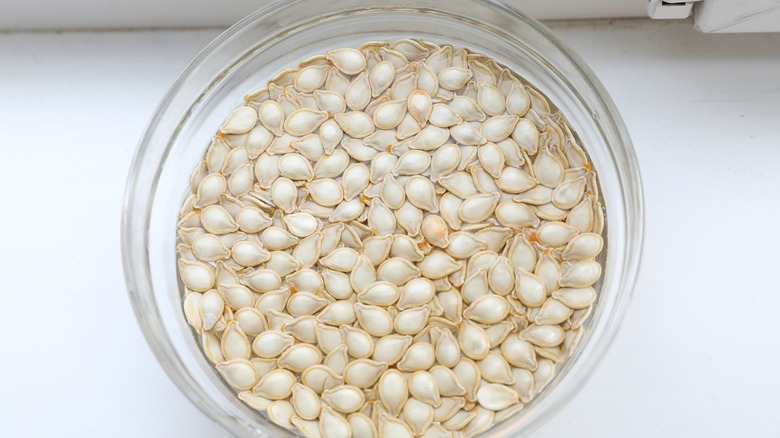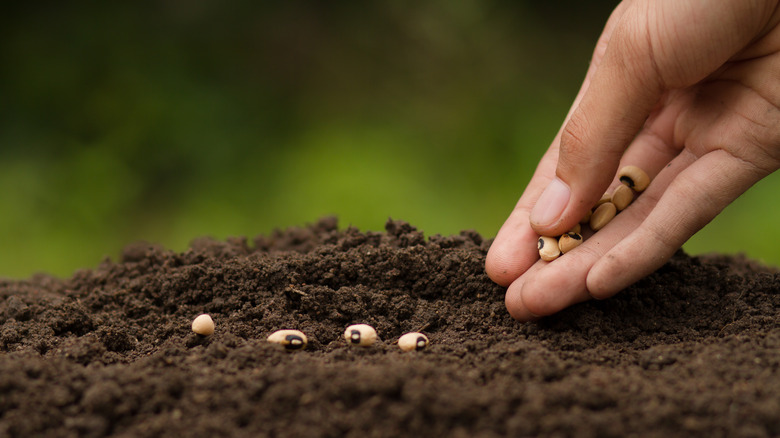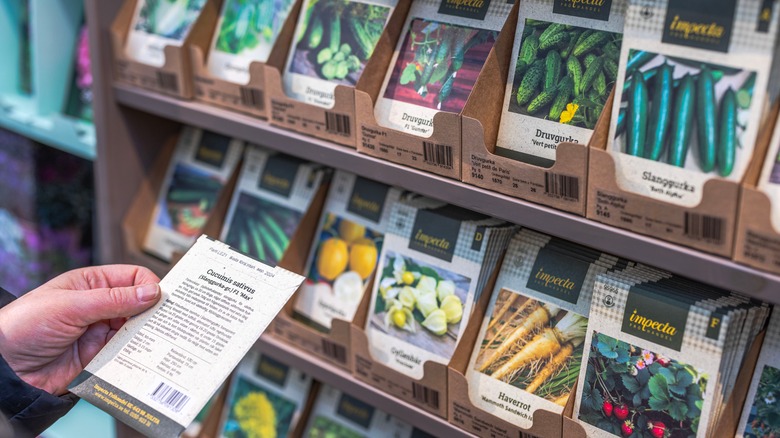Here's How Long You Should Soak Your Seeds For Optimal Growth
You've probably heard all manner of garden tips and tricks over the years, from using coffee grounds as fertilizer to destroying weeds with baking soda. One long-held kernel of garden wisdom is that soaking your seeds prior to sowing them can improve the germination process and better your chances of garden success. But how long should you soak your seeds for this trick to really work?
Our ears perked up at this TikTok from @gardenfrenzy, which provides some quick seed-soaking guidelines by vegetable type. Per @gardenfrenzy, gardeners should soak napa cabbage seeds two to four hours; cauliflower seeds three to six hours; cucumber seeds four to six hours; green bean seeds five to six hours; tomato seeds six to eight hours; chicory seeds eight to 12 hours; zucchini seeds five to six hours; eggplant seeds 20 to 24 hours; celery seeds 24 to 36 hours; spinach seeds 10 to 12 hours; and chili peppers 12 to 24 hours. While it's a handy quick guide, we wondered how accurate this TikTok timetable was, and how much of a difference soaking seeds really makes in the germination process.
Do I really need to soak my seeds?
When you soak seeds before planting, what are you accomplishing? Soaking seeds in water helps to break down seeds' protective outer shells, allowing moisture to reach the embryos faster and thus speed up the germination process. This can increase the number of seeds that germinate per planting, and move up your germination timeline, but most seeds will germinate fine on their own without additional preparation steps. Whether you soak your seeds or not is mostly up to you and your personal preference.
When it comes to the specific seed-soaking times that @gardenfrenzy lists in their TikTok, we couldn't find sources to support the specific windows of time listed. Some of the vegetables, like napa cabbage, cauliflower, chicory, and zucchini, are described as needing no preparation such as soaking prior to sowing by online seed vendors. Others, like cucumber and chili peppers, do not strictly require soaking, but may benefit from it. In cases where soaking or priming the vegetable seeds before sowing is generally recommended — among the vegetables listed in the TikTok, this includes spinach, eggplant, and celery — such specific windows of time were not emphasized, and most sources suggest a broader timeline of overnight to up to 24 hours for soaking. In general, most gardening resources recommend soaking seeds from anywhere between six and 24 hours, so it's unlikely that strict timing is needed by vegetable type when it comes to presoaking seeds.
Which seeds should I soak?
Some seeds will benefit more than others when it comes to soaking. Those seeds tend to be larger seeds with tougher or wrinkled protective shells; while soaking won't hurt most smaller seeds, the added moisture can make them more difficult to handle and sow evenly, so the cons may outweigh the benefits by most gardeners' standards. Seeds that benefit from pre-soaking include cucumber, beet, corn, squash, and pea seeds.
Soil quality will also make a difference in determining which seeds you should pre-soak. Since germination time is determined by moisture levels in the soil, fast-draining sandy soils and dense clay soils that are slow to retain moisture can affect germination time. If you plan to sow any of your seeds in those types of soil — or if the vegetables that will eventually sprout from your seeds require those soil types — it may be safer to soak them in advance to ensure they germinate. When in doubt, check the seed packet, but remember: seeds have been sprouting all on their own for centuries, as long as they're given healthy growing conditions!


